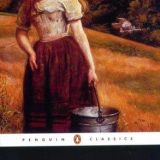Tess of the d’Ubervilles – Thomas Hardy – 1891
Reviewed by: Audrey Fu Date: 24 January 2002
Can Tess be Held Responsible for Her Own Fate?
——— on Hardy’s Tess of the D’Urbervilles
 In Hardy’s Tess of the D’Urbervilles, Tess, the heroine, has hardships and injustices endlessly heaped upon her, however, she never wallows in self-pity or abandons hope. Pragmatic and selfless, honest and kind, she is clearly shown to the reader to be “a pure woman”, as the subtitle of the novel states. Society, human selfishness, and the “President of the Immortals” are all guilty of dragging her inexorably towards her tragic grave, while she is innocent – or nearly so – and fights against her fate to the end.
In Hardy’s Tess of the D’Urbervilles, Tess, the heroine, has hardships and injustices endlessly heaped upon her, however, she never wallows in self-pity or abandons hope. Pragmatic and selfless, honest and kind, she is clearly shown to the reader to be “a pure woman”, as the subtitle of the novel states. Society, human selfishness, and the “President of the Immortals” are all guilty of dragging her inexorably towards her tragic grave, while she is innocent – or nearly so – and fights against her fate to the end.
Ironically, it is because Tess is so pure that she is banished from society, just as Jesus Christ becomes a martyr for truth. Again and again she has the opportunity to improve her own material lot but she is not prepared to compromise her principles. In Chapter XII, on learning of her affair with rich Alec, Tess’s mother exclaims, “Any woman but you would have got him to marry thee”. Tess, however, will not stoop to a “convulsive snatching at social salvation”. Similarly, Tess agonizes over whether to reveal her “Bygone Trouble” to Angel, and is twice warned: “Many a woman…have had a Trouble in their time; and why should you trumpet yours when others don’t trumpet theirs?” However, Tess does not follow the advice of her worldly-wise mother. A deeply moral person, she cannot bring herself to conceal the truth, when Angel believes her to be spotless.
Though Tess is not entirely without sin and does make mistakes in her life, in spirit her intentions are invariably good. Twice she is seduced by Alec and lives with him for a period of time, and there is little doubt that the second time at least, as a married woman, she is doing the wrong thing. However, both times she is not thinking of her personal gains or pleasure but of her family, towards whom she still feels a debt, and Alec ruthlessly takes advantage of this weakness to seduce her. After her father’s death, the family is evicted and becomes penniless. Tess, given a second chance, sacrifices her own peace of mind for the well being of her relatives: “My little sisters and brothers and my mother’s needs – they were the things you moved me by…and you said my husband would never come back – never!”
Until the moment of her final crime, Tess is prepared to suffer for others, to the extent of abandoning all hope of personal happiness with Angel; yet her most altruistic actions are perversely seen by society as evidence of her immorality. Because of her sacrificial attitude, Tess becomes a natural scapegoat, and those around her find it easy to shake off their own responsibilities. In the very beginning of the novel she is propelled from her sheltered existence into the clutches of Alec, because she wrongly feels entirely responsible for the death of the family’s horse and thinks it her duty to support the family after this catastrophe. Similarly, it is out of respect for Angel’s preposterous wishes that she refrains from writing to him in Brazil to tell him how she misses him, until it is too late. Furthermore, it is because she can sense an air of reproach in her family when she returns home for the second time that she casts herself out and endures physical hardship and mental pain at Flintcomb-Ash. Her sensitivity to others’ emotions undoubtedly plays a central role in the ruination of her life, and so in absolute terms Tess is at least partly responsible for her fate.
 There is a slight suggestion in Hardy’s writing that Tess’s stoicism is derived from pride and self-righteousness. When Angel hypocritically rejects her on account of her past, “if Tess had been artful, had she made a scene, fainted, wept hysterically…he would probably not have withstood her”, the narrator comments, “Pride, too, entered into her submission – which perhaps was a symptom of that reckless acquiescence in chance too apparent in the whole d’Urberville family.” However, this is the only reference in the novel to any self-respect feelings in Tess, and until the bitter end she is depicted as unassuming, pragmatic, and determined not to give in to fate like her family or the other Talbothays girls. It is because she worships Angel that she is proud not to contradict him, in the same way martyrs are proud to be tortured for their God.
There is a slight suggestion in Hardy’s writing that Tess’s stoicism is derived from pride and self-righteousness. When Angel hypocritically rejects her on account of her past, “if Tess had been artful, had she made a scene, fainted, wept hysterically…he would probably not have withstood her”, the narrator comments, “Pride, too, entered into her submission – which perhaps was a symptom of that reckless acquiescence in chance too apparent in the whole d’Urberville family.” However, this is the only reference in the novel to any self-respect feelings in Tess, and until the bitter end she is depicted as unassuming, pragmatic, and determined not to give in to fate like her family or the other Talbothays girls. It is because she worships Angel that she is proud not to contradict him, in the same way martyrs are proud to be tortured for their God.
Throughout the novel, then, Tess is shown to be pure in intention and selfless in all acts, until she surprisingly, spitefully murders Alec. This is the single action that proves to be her ultimate downfall, a totally unnecessary crime of passion. Perhaps any other person in the same situation would have cracked much earlier, perhaps any other person would not have attempted to abide by the rules of personal morality for so long; nonetheless, Tess has no right to take Alec’s life.
In terms of the society in which she lives, Tess is to some extent guilty of bringing about her own fate, and is somewhat her own hangman. However, it is this same society that has so unjustly marked her out as unclean, that has so forcefully put the noose around her neck. This society blindly ignores Christian principles, judging her on deeds and not on intentions, and unwilling to forgive her past. “This impure society”, argues Hardy, “punishes the honest and the conscientious”. There is another factor too in Tess’s downfall, namely, a fate that has sought in every step of Tess’s life to trip her up, a “President of the Immortals” that plays with Tess in the way a cat plays with a helpless mouse. Tess is alone fighting against these huge forces, the social and the natural, heroically defending virtue in the face of rampant vice. It is little wonder she finally cracks. Indeed, it may well be because she finally cracks, because she is human, that the reader admires her and sympathizes with her to such an extent.
~
Reviewed by: D.W. Cymbalisty dcymbalisty@hotmail.com Date: 17 May 2001
 Many years ago, after completing a grueling mind-numbing week of exams in college I sat down to read this story, as a sort of reward for living through the previous five days. (Some folks reach for ice cream… I reach for a book). I’d never read Hardy before, but since then I’ve read many of his books, and Tess remains the dearest to me.
Many years ago, after completing a grueling mind-numbing week of exams in college I sat down to read this story, as a sort of reward for living through the previous five days. (Some folks reach for ice cream… I reach for a book). I’d never read Hardy before, but since then I’ve read many of his books, and Tess remains the dearest to me.
Early on, in chapter 4, Tess is on a journey at night with her little brother Abraham and he is asking her if all the stars in the night sky are worlds similar to ours. She compares them to apples on a tree and concludes that most of them are “splendid and sound – a few blighted.”
“Which do we live on?” asks Abraham. “A blighted one,” says Tess. Minutes later, their carriage crashes into some oncoming traffic… the family horse Prince is killed, and Tess is plunged through this incident into predicaments that will result in her complete undoing.
Those who are familiar with Hardy will know of his fatalistic tendencies. His themes are not exactly “oh how joyous”. And here, in the above incident he sets that ominous tone that is so ubiquitous in his work. Tess is the story of an exceptionally gifted and beautiful peasant girl of decayed aristocratic stock who is betrayed by two men: one is the rich and sensuous Alec D’Urberville, the seducer of her body and for a while of her emotions; by him she has a child which dies in infancy. The other is the intellectual free-thinking son of a clergyman (Angel Clare), whom she loves with her whole being, and who ruthlessly abandons her when he hears, immediately after their marriage, of her earlier violation. Here is a picture of that Victorian double-standard that similarly condemned Hester Prynne in Hawthorne’s “The Scarlet Letter”. Angel fully expects Tess to forgive his own past indiscretions (and she does), but he, in turn, will not forgive hers. More precisely, he flounders in his disillusionment, and cannot make the inner journey from forgiveness to forgetness… as is obvious when he says to her in Chapter 35 “O Tess, forgiveness does not apply to the case. You were one person; now you are another.” The double-standard breaks our heart even as we read of it.
And hearts are broken here. It is not until many years later that Angel realizes his error by pondering on the Biblical story of “the wife of Uriah being made a queen” (2 Sam.11:1-27). Realizing (a bit too late) that he had judged Tess by the deed rather than the will, he searches for the girl… only to find that the extreme poverty of her family has driven her back to the other man. So strong is Tess’s love for Angel Clare, and so powerful her disgust at what Alec D’Urberville has forced her to become, that she kills Alec. Now husband and wife are re-united but on the run from police, and they share a few days of loving reconciliation before Tess is arrested, tried, sentenced to death for murder, and… (read the book).
Hardy considered this to be his finest novel, and claimed that Tess was the most deeply felt character he ever created. Originally published in 1891, it yet remains a timeless story of the power of love to overcome the most profound betrayal. Significant is Hardy’s choice of the subtitle: “A Pure Woman”.
“Poor wounded name! My bosom as a bed shall lodge thee.” – Shakespeare –















